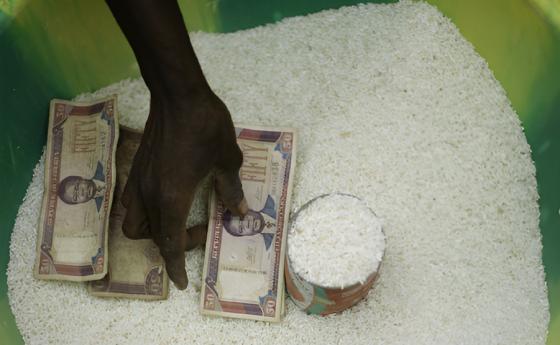Liberia and the Politics of Rice

As of Oct. 2, price for a cup of rice in Ganta, Nimba County is beyond L$120 (US$0.8) per cup.
... The road to food security should be a path of clear thinking with the right kind of investment priority, void of everyday politics. The history of the 1979 rice riots leaves a trail that rice and politics should not be mixed and a government that intends to solve this issue has to play the long game with a clear approach to leading the nation toward food security. The buck stops here.
Some forty-three years ago, President William R. Tolbert Jnr had a bold vision to tackle the production of rice — the nation’s staple. President Tolbert’s policy was economically prudent and no doubt, exceedingly visionary, but it failed the test of the politics of the day. Sad!
Liberian politics of the 1970s was tense, full of mud fights, slander, fueled by long standing anger that dates back to the founding of the Liberian nation in the 1800s.
It was marred with distrust of the political status quo, deep-seated suspicion towards the government, etc. By 1971, when President Tolbert became President, the nation was already on a time bomb. The explosion was somehow inevitable. The founding years of Africa’s first black Republic were filled with the burden of imbalances of political participation, accusations of marginalization, inter-tribal wars, settler versus native divide, etc. The writings were on the wall.
This was the period that greeted the Presidency of William R. Tolbert Jnr — perhaps one of Liberia’s most visionary leaders. When President Tolbert became President, he was walking into a minefield. The system that preceded his Presidency had set him up for the level of malice, misinformation campaign, psychological warfare and in some cases, reckless antagonism that he faced throughout his presidency until his eventual overthrow.
Sometime in the late 1970s, the administration of President William R. Tolbert, Jnr had proposed an increment in the price of imported rice. The move, as explained by Agriculture Minister Florence Chenoweth, was to encourage local production and incentivize the farmers.
However, a group of firebrand politicians dubbed the progressives went neck-and-neck with the government for the proposed increase. The group had threatened to stage a demonstration to protest the proposed increase and by April of 1979, the demonstration had gained momentum amongst the masses, most of who were already politically charged.
The demonstration resulted in the infamous 1979 rice riot — a civil disobedience that ensued when the organizers lost control of the demonstration.
The government's response to the demonstration was chaotic, opening fire on unarmed civilians, thus provoking a riot that turned deadly. Pandemonium took over and street urchins and other opportunists went on a looting spree and vandalism — all in the name of rice. The government of President Tolbert was overthrown a year after.
Today, 43 years after, no successive Liberian Administration has been able to solve the issue of Rice. It is a shame!
I was born some few years after the coup of 1980 and today, my generation is faced with a problem left behind by our forebears. It would be naïve to dismiss the struggles of the progressives and other activists, student leaders, etc in the fight for social justice, political pluralism, freedom of the press, and the level of democracy we enjoy today, despite its imperfections.
But, members of the progressives have a burden of history, at least in some part, to reflect and answer the question of rice and how it continues to haunt us today, despite the brutal assassination of President Tolbert some 42 years ago on April 12, 1980.
It is noteworthy to mention that members of the progressives have always been around the helm of power since 1980 and could have offered the needed suggestions for which they so vehemently opposed the policy direction of President Tolbert. Unfortunately, not.
A greater share of the burden is also on the Liberian governments from 1980 to 2022. (Four democratically elected Administrations) None have demonstrated vision, tenacity and will to tackle the issue of rice beyond smokescreen kneejerk approaches.
This crisis has become a burden of the current generation of political actors, activists, everyday people, etc. Like Frantz Fanon said, “Each generation must discover its mission, fulfill it or betray it, in relative opacity.” Did the generation before us fulfill this mission? The answer is left to History.
Now, 43 years after, we have to revert to the scripts of President Tolbert and face the humbling reality that the key to food security is policy that invests in local production, in this case, rice.
The need for deliberate research in the local production of rice should be a demanding policy for any administration with a goal to solve the recurrent problem of rice and its availability. The attempt to solve the rice problem, perhaps one of the highest imported commodities will have a trickle-down effect on many other sectors of the economy.
The road to food security should be a path of clear thinking with the right kind of investment priority, void of everyday politics. The history of the 1979 rice riots leaves a trail that rice and politics should not be mixed and a government that intends to solve this issue has to play the long game with a clear approach to leading the nation toward food security. The buck stops here.
Editor’s note: The views expressed in this commentary are solely of the author and do not necessarily represent that of the Daily Observer newspaper.
The AuthorLekpele M. Nyamalon is a writer, poet, author, speaker, OSIWA Poetry fellow, and a Mandela Washington Fellow. He can be reached at nyamalon23@gmail.com.
